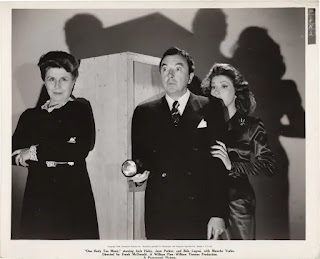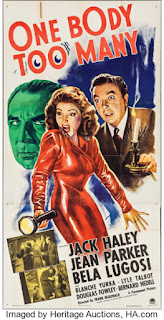Arguably one of Bela Lugosi's more obscure films, One Body Too Many is also not really a Bela Lugosi (20 Oct 1882 – 16 Aug 1956) vehicle: he plays a rather tertiary role as the Merkel the butler, whose primary function, alongside housekeeper Mathews (Blanche Yurka [19 Jun 1887 – 6 Jun 1974]), is to be a glaring red herring. Cool, collected, obviously of foreign roots and capable of dropping his intgratiating smile in a split second, Merkel forever says and does things — like picking up a bottle of rat poison saying something like "There are too many rats in the house" just before serving coffee to the collected guests — that make it impossible to believe that he (or Mathews) are truly the bad guys.
Not that the both Merkel/Lugosi and Mathews/Yurka don't come across as bad guys: much like Lugosi, Yurka, a now mostly forgotten but former successful "serious" stage character actor, was quiet capable of exuding unspoken threat and danger, if not subtle emotion in general, in both small and larger parts, as evidenced in more than one film. (See, for example, her great performances in A Tale of Two Cities [1935 / trailer] and Queen of the Mob [1940 / full film], as well as turns in lowbrow fun like Hitler's Madman [1943 / trailer], Escape [1940 / trailer], and the failed Cry of the Werewolf [1944 / trailer].) The two are the best things about the movie, actually, with Lugosi in particular managing to make his minor part a joy to watch.
A trailer to
One Body Too Many:
The true star of One Body Too Many, however, is Jack Haley (10 Aug 1897 – 6 Jun 1979), a name that if anyone remembers today then only for one role: Haley played the Tin Man (and his counterpart, farmhand Hickory) in The Wizard of Oz (1939 / trailer), a film treasured and respected in the USA far more so than in other countries.
Here, in One Body Too Many, he plays the rather mild-mannered insurance agent Albert Tuttle, who shows up for his late evening appointment with the multi-millionaire Cyrus J. Rutherford unaware that the man is dead and that all the possible beneficiaries have shown up for the reading of the will. As is typical, the will is one of those found only in movies like this, full of eccentric clauses, including one that states that all possible heirs, under the threat of disinheritance, must remain in the house until he is buried.
As where Rutherford should be buried also influences who gets what, various people see it as to their advantage that the body disappear — including someone who is willing to kill. The obvious good gal of the movie, Carol Dunlap, played by the cheesecake-worthy Jean Parker ([11 Aug 1915 – 30 Nov 2005] of Rene Clair's The Ghost Goes West [1935 / full film] and E.G. Ulmer's Bluebeard [1944 / trailer]), an attractive and passable actress whose career never truly blossomed as was perhaps expected, convinces Tuttle to remain and guard the deceased's body. This, of course, leads to diverse macabre, mysterious, and dangerous (if not also funny) situations, some of which are close to deadly. (Others in the film are less lucky than Tuttle: the final body count of rather indiscriminately chosen victims is around three or four.)
One Body Too Many has long been in the public domain, so as disremembered as the film might be it is easily available. The copy we had, part of a low-rent 50-film package, was of course substandard and much too dark, which made it occasionally difficult to fully see what was happening. But while a better quality version would undoubtedly make for a better viewing experience on the whole, it would probably not really affect one's final perception of the movie. It is, in the end, an enjoyable but second-rate Old Dark House comedy mystery that offers nothing truly new but makes for an easy way to pass 105 minutes.
However, while fun and peppered with some delightfully ridiculous sequences — for example: the scene where Tuttle is reading a mystery book and everything he reads also, in "real" life, happens directly behind him is fun; almost everything around the protracted scene in which he is locked in a coffin that is then sunk in a fish pond is entertaining; and the location of the body of the dead Kenneth Hopkins (character actor Lucien Littlefield ([16 Aug 1895 – 4 June 1960], who plays the doctor in the true masterpiece of all Old Dark House films, Paul Leni's The Cat and the Canary [1927 / full film]) is inspired, and the final chase and big-save scene both ridiculous (the chase) and somewhat thrilling (the final fight with the bad guy) — the movie nevertheless feels much too familiar and, by the end, a tad too long. The last, in part, because Tuttle/Haley really isn't all that engaging of a hero and way too much of what happens (as well as how the characters interact) is less convincing or funny than rote clichés of the genre — yep, the film even has the mandatory secret passageways, thunder storm, and washed-out bridge.
The blame that One Body Too Many is hardly a comic success could perhaps be placed upon the production firm, Pine-Thomas Productions. A B-picture production firm that eventually rose to lower-echelon A-pictures, Pine-Thomas was famous for tightly budgeted films that never lost money and the use of name actors descending the career ladder. (It is perhaps telling that despite a span of activity ranging from 1941 to 1955, Pine-Thomas never managed to release even an acknowledged minor classic.) Hardly specialists in comedy, One Body Too Many was both their second production of the genre and with Jack Haley; like their first comedy & Haley film (and musical, actually), Take It Big (1944), the directorial chores were handed over to Frank McDonald (9 Nov 1899 – 8 Mar 1980), a solid but unexceptional journeyman director who more or less stumbled into his career.* That said, his 1959 crime flick The Purple Gang [trailer] is pretty good.)
* "I've never seen anyone as terrified of directing as Frank McDonald," says Evelyn Brent in Evelyn Brent: The Life and Films of Hollywood's Lady Crook by Lynn Kear& James King [2006, MacFraland & Co.].
Still, considering how atrophied the funny bones of Pine-Thomas Productions and McDonald, not to mention scriptwriters Maxwell Shane (26 Aug 1905 – 24 Oct 1983) & Winston Miller (22 Jun 1910 – 21 Jun 1994) — both from western film backgrounds — obviously were, the real surprise of One Body Too Many is that it is even funny at all.
It is noticeable that McDonald put more thought and care into his direction than, say, the one-sixteenth Native American director Wallace Fox (9 Mar 1895 – 30 Jun 1958) did into the far lower-budgeted Lugosi film The Corpse Vanishes (1942), but what that poverty row product has that One Body Too Many lacks is that those involved in Corpse had the guts to go camp and ga-ga. Possibly because the earlier film was so obviously ridiculous and lowbrow, the men responsible filled it with every possible idiocy and laugh that they could, not to mention some truly inspired dialogue. In comparison, One Body Too Many is almost staid in its humor, even when it involves something as stupid as Haley losing his clothes, and the verbal exchanges, despite an occasional bon mot, never truly shine or impress.
One Body Too Many: hardly the worst way to spend a rainy day, it is nevertheless a lesser comedy, a lesser Old Dark House mystery, and a lesser Bela Lugosi film in which he does an excellent performance with fine presence in a too-small part — which, when combined, sort of makes the movie a better Lugosi film, doesn't it? It is a shame, on the whole, that the movie doesn't have a stronger lead actor and that the humor isn't more consistent and effective.
That said, the film is a treat for fans of familiar faces, including an un-credited William Edmunds ([18 Sept 1889 – 7 Dec 1981] of House of Frankenstein [1944], The Beast with Five Fingers [1946], Background to Danger [1943] and so much more) as Prof Hilton and, as Jim Davis, one of the jerk-ass greedy relatives, the great and incredibly busy actor Lyle Talbot ([8 Feb 1902 – 2 Mar 1996] of, among other great or fun films, A Shriek in the Night [1933 / full film], Sam Newfield's Wild Weed [1949 / full film] a.k.a. She Should Have Said 'No'! [trailer], Untamed Women (1952 / full film) and Outlaw Women [1952 / trailer], Ed Wood's anti-classic Glen or Glenda [1953 / trailer] and lesser Jail Bait [1954], Mesa of Lost Women [1953 / trailer], Jack Arnold's anti-classic High School Confidential [1958 / trailer], City of Fear [1959 / trailer], and so much more.)
Full film —
One Body Too Many:
















No comments:
Post a Comment